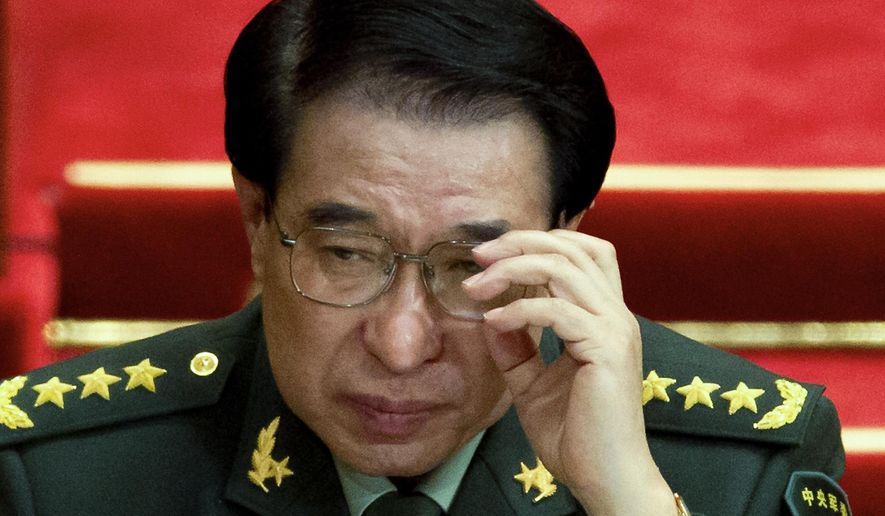China on Thursday took the rare step of publishing a list of 16 senior People’s Liberation Army officials who were purged on mostly unspecified corruption charges since the beginning of 2014.
Even though most of those on the list have been known to have been purged through unofficial leaks or veiled official reports, the publication is an unusual open confirmation of a group purge, just two days after the completion of the fifth plenary session of the 18th Chinese Communist Party’s Central Commission for Discipline Inspection. The commission is the all-powerful extrajudicial organization in charge of weeding out corrupt officials through secret investigations, unannounced arrests and other “strong remedies” that President and Communist Party General Secretary Xi Jinping said are necessary to “cure the illness.”
“Our determination to use strong remedies to cure illness will not change,” Mr. Xi vowed at the plenary session. “Our courage to rid our bones of poison will not diminish. We will continue to hold the sharp sword of anti-corruption high.”
The 16 military officials on the list are all PLA commanders at the corps (provincial) level or above, including Gen. Xu Caihou, who was the highest uniformed officer of the PLA from 2004 to 2012 as vice chairman of the Communist Party’s Central Military Commission, the military’s ultimate command authority.
Gen. Xu, according to the announcement, “came under investigation in a special case,” the euphemism in People’s Republic of China political parlance for arrest, in June and was officially charged in October with unspecified corruption crimes involving “an enormous amount.”
President Xi is a proven believer in Maoist “mass line” campaign that involves the instigation of nationwide public sentiment to wage internal power struggles. Since coming to power in November 2012 as a seemingly meek successor to the relatively meek Hu Jintao, Mr. Xi has used this “mass line” tactic to establish himself as the undisputable strongman of the communist nation.
Mr. Xi’s primary use of the tactic has been to target senior Communist Party officials, many of them deemed challengers to his leadership. Other targets are notorious party debauchees and are deeply hated by the people on the street. Using Mao-era verbiage, the president says those corrupt senior officials are guilty of following “the four undesirable work styles of formalism, bureaucratism, hedonism and extravagance,” which has since become a party mantra.
Of the 16 purged figures, only one — Gen. Chen Qiang, an intercontinental ballistic missile base commander stationed in Hunan Province — was sentenced to life in prison by a military tribunal in May. The others are said to be detained and still “under investigation” by either the Central Military Commission’s disciplinary organs or provincial military districts’ investigative agencies.
In addition to “mass line struggles” against senior military officials accused of being corrupt, Mr. Xi has been following closely the historical trend of consolidating power by removing powerful security and intelligence chiefs he inherited from Mr. Hu.
Zhou Yongkang, the most senior security chief under Mr. Hu and a former member of the Politburo Standing Committee, was considered to be one of Mr. Xi’s most formidable challengers, with a network of proteges and followers believed to be widespread throughout the Chinese government. Mr. Zhou was purged last year on unspecified corruption charges after nationwide arrests of many of his underlings and colleagues, including some of China’s most senior intelligence and espionage chiefs.
Last week, a party-managed leak to the press accused Mr. Zhou of plotting a coup against Mr. Xi’s succession, working in close collaboration with former Politburo member Bo Xilai, the most charismatic and capable of all senior communist leaders. Mr. Xi saw Mr. Bo placed in prison with a life term in September 2013 after a sensational show trial.
Last week, Ma Jian, deputy minister of the Ministry of State Security, the primary arm of foreign espionage and counter-intelligence, was sacked for “financial improprieties.” Mr. Ma was considered a close ally of another senior official named Ling Jihua, a leftover from the Hu era recently disgraced as another corrupt “tiger.”
Mr. Ma is a spymaster at the Ministry of State Security with partial responsibility for China’s vast networks of foreign espionage and counterintelligence operations worldwide, wielding enormous power within China’s national security community.
• Miles Yu’s column appears Fridays. He can be reached at mmilesyu@gmail.com and @yu_miles.
• Miles Yu can be reached at yu123@washingtontimes.com.




Please read our comment policy before commenting.